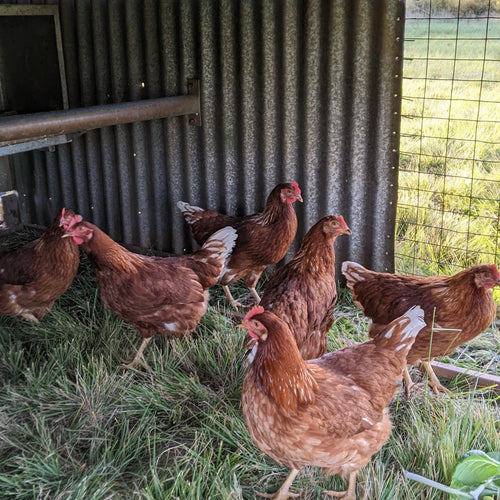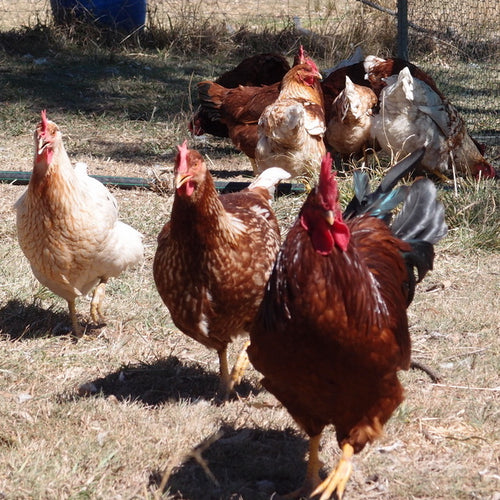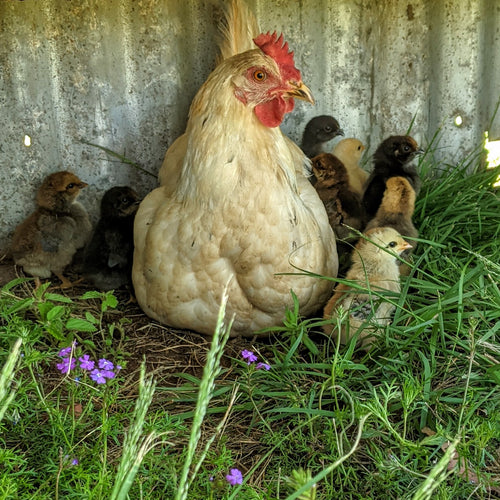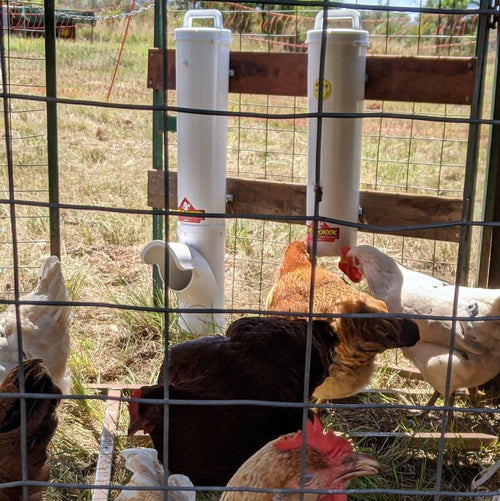Buying new chickens
Every year in Spring we start trying to hatch more chicks to replace old hens and roosters and raise a few extra to eat. Sometimes we also buy some chickens if we don’t hatch enough, or if we want to add some new genetics to the flock (rather than having a rooster with all his sisters, aunties and possibly his mother!). Recently we have found it a real challenge to source good quality heritage breed chickens, so I thought I’d write about what we’ve learnt about buying chickens.
Which breed to buy?
I’ve written before about why we choose to support heritage breeds. You will find it much easier to source hybrid laying or meat chickens from most produce stores in Australia
Its best to read about the breeds and decide what you want before you get to the market or visit a breeder. At least you will know what its supposed to look like! Some of the published information about the breeds is no longer accurate as many of the old characteristics have been bred out of the birds by show breeders. They are looking for certain aesthetic characteristics rather than laying or meat quality.
It is worth reading about the temperament of certain breeds though. Some are flightier than others and not suited to being confined, so it depends on how you plan to keep them whether they will be suitable. And some of the climate information may be relevant (ie heavier plumage does better in cold weather), although if you are buying locally, they should be adjusted to your climate already.
I also wouldn’t recommend mixing up too many breeds, particularly if they are different sizes and temperaments. We had some small flighty hens of unknown breed for a while and they were always picked on and victimised by the other larger hens, they always looked so nervous and unhappy. We now keep all the Rhode Island Reds together and all the White Leghorns together, which seems to keep them all happy.
What age to buy?
You can buy chickens at any age, they’re usually cheaper the younger they are, but will take more effort to raise up to laying age. You can even order fertile eggs if you have an incubator or broody hen. If you buy chicks, you may be taking you chances with the sex of the bird, so if you really want hens it might be better to wait until they’re a few weeks old and its easier to tell what they are. This will also help to make sure you get the breed that you wanted. We are set up to raise chicks, so we don’t mind buying them at any age we can get them! If you don’t want the extra hassle, just buy point of lay, but keep in mind that a dishonest breeder could claim hens of any age as “point of lay”, at least if you get them just before laying you know they are young!
Finding a breeder
The best resource we use for finding chickens to buy is farmstock.com.au. So far we’ve not found any breeders in our local area that we want to go back to, they all keep too many chickens in unhealthy conditions. We will keep searching! You can also meet breeders at the markets and ask what chickens they have and if you can visit their property. Many areas have chicken or poultry clubs, but these breeders are often breeding for shows and will be more expensive, and the chickens may not be the best for laying or meat.
How many to buy
You should buy at least two new chickens, its very difficult to introduce one new chicken (unless it’s a rooster), as small young hens will get picked on by the older hens, at least if they have a mate or two with them, they can hang out together and avoid the older hens. We even had trouble with a large rooster not getting on with the hens at first as he’d been raised with another rooster and learnt to be submissive, but it didn’t take him long to take charge!
Choosing a bird
Try to have a good look at the bird to make sure its healthy, bright eyes, shiny feathers, no poo around its vent, are all indications of a healthy bird. We recently bought some young chickens which had feathers missing. They are ok so far, but I only bought them because I felt sorry for them and we’d driven a couple of hours to pick them up. As I said, we’re still trying to find a decent breeder to buy from! This lady had too many in the cage, with no access to grass. It was awful. They are our “rescue chickens” and I hope they re-feather soon. If you’re really serious about starting a flock, don’t buy rescue chickens, try to find some healthy ones!
Bringing the chickens home
You will need a box or a cage to transport the chickens. They will need to be kept cool, so the back of a ute or inside a car is ok, but not in the boot of a car. A nice dark box, without too much room to move seems to be a good option. We sometimes use a cage in the dog box on the back of our ute. If you put a cage of the back of the ute without a cover, the poor birds will lose feathers in the wind, ok for short journeys only!
When you get home with the chickens they should spend some time in a pen separated from the other chickens in case they are sick or have parasites that you don’t want to spread to the others. At least a week is enough to keep an eye on them for anything unusual. Don’t let them out to free-range for a few days (or even weeks if they’re younger than point of lay) to give them time to get used to their new home. When you do let them out, just open the door a few hours before sunset, so they can’t go too far. Then you can let them out earlier and earlier each day.
Do you buy chickens? Any advice?
Do you buy chickens? Any advice?
More from:
chickens























Leave a comment